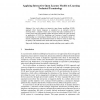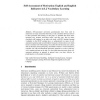43 search results - page 5 / 9 » Modeling Students' Metacognitive Errors in Two Intelligent T... |
UMUAI
2008
13 years 7 months ago
2008
Abstract. Self-efficacy is an individual's belief about her ability to perform well in a given situation. Because selfefficacious students are effective learners, endowing int...
UM
2001
Springer
13 years 12 months ago
2001
Springer
Our work explores an interactive open learner modelling (IOLM) approach where learner diagnosis is considered as an interactive process involving both a computer system and a learn...
AIED
2011
Springer
12 years 11 months ago
2011
Springer
Self-assessment motivation questionnaires have been used in classrooms yet many researchers find only a weak correlation between answers to these questions and learning. In this pa...
AH
2006
Springer
13 years 11 months ago
2006
Springer
Intelligent tutoring systems achieve much of their success by adapting to individual students. One potential avenue for personalization is feedback generality. This paper presents ...
FLAIRS
2006
13 years 8 months ago
2006
We have been using the concept map of the domain, enhanced with pedagogical concepts called learning objectives, as the overlay student model in our intelligent tutors for program...


